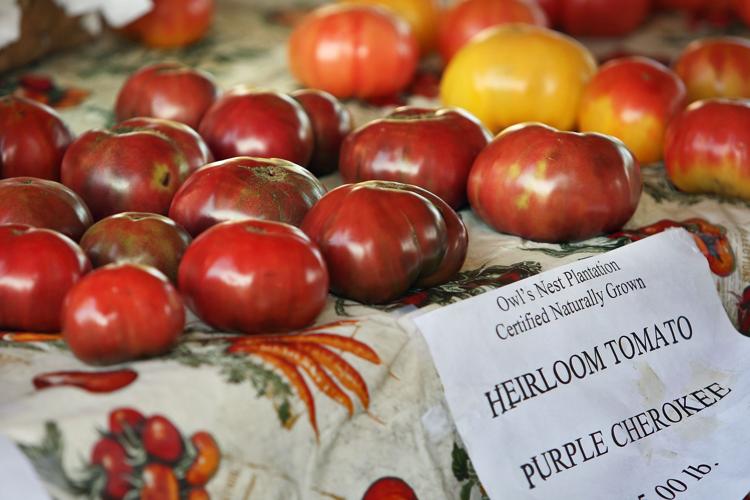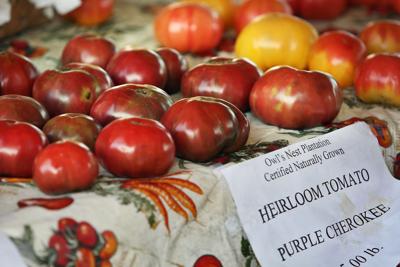Josh Johnson, farmer and owner of Old Tyme Bean Company in Elloree, remembered growing up against the backdrop of his grandmother's garden. As he watched her save the seeds from batches of successful crops, he learned about heirloom produce for the first time.
Ten years ago, he followed in her footsteps by growing heirloom peas and beans of his own at Old Tyme.
"I guess you would say I like to think outside the box," said Johnson. "I wanted to grow something that's of more value than a straight commodity — something that takes more work and more effort."
When it comes to growing and selling heirloom produce — or fruits and vegetables that have been preserved and reproduced, true-to-form, for at least 50 years — Johnson is not alone. But the national heirloom industry has stayed small and self-selective, according to Dave Lamie, Professor of Agribusiness and Rural Development at Clemson University.
"It's a new industry that is composed of a lot of small businesses with lots of one-on-one personal relationships and connections," Lamie said. "It's not matured in the way some others have, and that's also part of its charm."
Lamie said his newly collected national consumer survey data about heirloom awareness reveals that, between the crops' premium price point and the small market size, many respondents viewed learning about heirloom produce as a "low priority."
"By and large, consumers aren't really aware," he said. "While it's becoming more popular, it's always risky (for farmers)."
Heirloom growing and selling in South Carolina is no exception to Lamie's findings. Augustus Jenkins "Jenks" Farmer, Columbia-based gardener and author, grows heirloom vegetables for personal use in his downtown Columbia urban garden. He argued the small scale of the heirloom industry can lead to generalizations and misconceptions about the crops. He is eager to dispel them.

Vendors pile fresh produce on their tables at the Charleston Farmers Market.
"Heirlooms go beyond looking pretty — heirlooms are the survivors," said Farmer. "There were, and have been, tons of vegetable cultivars over the centuries. Many of them failed for good reason, and what’s left are the ones we love."
But in some corners of the state, community members report a growing interest in heirloom produce — in part, by growing it themselves. Across six Richland Library branches, the Seed Library allows guests to "check out" gardening seeds, with the expectation that they'll return some seeds from the produce that they grow from them.
Kelsey Andrus, director of the Seed Library, said the library saw 8,200 seed packet checkouts in 2023 — a record number since its founding in 2018. So far this year, gusts have checked out over 4,000 seed packets. Based on trends for previous years, she projects that the total number of checked-out seed packets will reach 10,000.
"I used to have no choice in what seeds we got. Now I get to curate the entire collection and base it on what people request," Andrus said. "It has severely evolved over time."
Andrus also believes that the patrons of the Seed Library have demonstrated a connection to local heirlooms.
"People are excited about are heirloom vegetables, particularly ones that are very traditional for our area," she said. "Onions and lettuces developed here are the ones that fly off the shelves well before anything else does."
Some agriculture experts suspect that the people who are drawn to heirloom produce are especially attracted to the story behind each crop.
"There's that connection to the past," said Eva Moore, communications director of the South Carolina Department of Agriculture. "If you're growing an heirloom variety, it automatically makes you think about the history of that produce — who's grown it and who they grew it for — which you don't necessarily get with all crops."
"The reason they're heirloom is because they have been so good and so tasty for so long," added Randall Isherwood, Chief Executive Officer of Gardener's Outpost, a garden center with two locations Columbia. "People actually took the time and energy to pass these things down."
Although Andrus reported increasing numbers of checkouts at the Seed Library, she admits that there are some consistent favorites across branches. The most popular seed packet checkouts echo the findings of David Shields, professor at the University of Southern Carolina and chair of the Carolina Gold Rice Foundation. They both concur that the Cherokee Purple Tomato is one of the most popular and ubiquitous heirloom crops.
"I cannot keep those in stock no matter what I do," said Andrus. "Everybody wants them, to the point where those are one of the most expensive seeds that we buy."
But Farmer encouraged first-time growers to look past the most popular crops and to diversify their heirloom garden.
"Everybody wants to grow tomato. Tomatoes are like the gateway vegetable, which is unfortunate, because they're tough to grow," he said. "In my opinion, there are so many easier, more rewarding things to grow."
He recommends Armenian cucumbers, cucuzzi squash and creasy greens.

Jenks Farmer's mother, Gloria Farmer, sits with an heirloom Savoy cabbage — perfect, Farmer said, for coleslaw.
For those interested in growing heirloom produce in South Carolina, Paul Grant, owner and operator of Freshly Grown Farms in Columbia, advises people to be vigilant about environmental challenges in the state.
"You can't replace the sun, so the weather is number one," Grant said. "And it's pretty unpredictable these days."
"Heirlooms are more difficult to grow," agreed Lamie. "They're typically more finicky crops, and farmers have to go through all that trouble to produce it."
Old Tyme's Johnson, who has struggled with rain and mold while growing his heirloom crops, argued that selecting for weather-resistant traits is one of the best ways for heirloom farmers to ensure a bountiful harvest. For those who are up for the challenge, Johnson said that the payoff of growing heirloom produce is well worth it.
"Everything that we eat comes from a seed, and someone had to save that seed," he said. "In doing so, you save a little bit of heritage and a lot of family ties."












